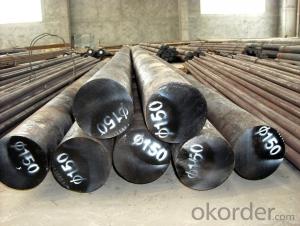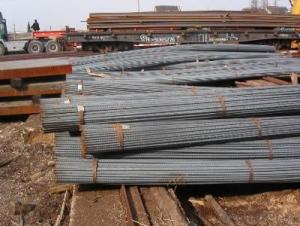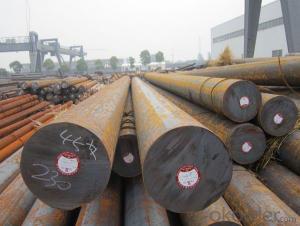Wholesale AISI 420 Medium Carbon Special Steel
- Loading Port:
- China main port
- Payment Terms:
- TT OR LC
- Min Order Qty:
- 25 m.t.
- Supply Capability:
- 10000 m.t./month
OKorder Service Pledge
OKorder Financial Service
You Might Also Like
Item specifice
Specifications
1.ISO9001:2008 certificate
2.Competive price and Best quality
3.On-time delivery
Chemical Composition(GB)%
| C | Si | Mn | Cr | P | S |
| 0.4 | 0.5 | 0.7 | 13 | ≤0.030 | ≤0.030 |
Standard
| GB | ASTM | DIN | JIS |
| 4Cr13 | 4.2 | 1.2083 | 420J2 |
Available Size
| Rolled plate | 12-120mm*720mm*6000mm | ||
| Module | 130-400mm*1000mm*6000mm | ||
Heat Treatment
| Processing | Temperature ℃ | Hardness |
| Anneal | 750-800 | ≤235HB |
| Quenching | 1050-1100 | ≥50HRC |
| Tempering | 200-300 | ≥50HRC |
Characterstics
| 1.High corrosion resistance and mirror performance | |||||
| 2.Higher strength and abrasion resistance |
Applications:Suitable for precise dies with super mirror performance and abrasion resistance,camera components,optical lens 420J2 STEEL


1, Your advantages?
professional products inquiry, products knowledge train (for agents), smooth goods delivery, excellent customer solution proposale
2, Test & Certificate?
SGS test is available, customer inspection before shipping is welcome, third party inspection is no problem
3, Payment Terms?
30% TT as deposit and 70% before delivery.
Irrevocable L/C at sight.
4, Trading Terms?
EXW, FOB, CIF, FFR, CNF
6, After-sale Service?
We provides the services and support you need for every step of our cooperation. We're the business partner you can trust.
For any problem, please kindly contact us at any your convenient time.
We'll reply you in our first priority within 24 hours.
- Q:How is alloy steel used in the manufacturing of gears and shafts?
- Alloy steel is commonly used in the manufacturing of gears and shafts due to its superior strength, durability, and resistance to wear and tear. Its unique properties make it ideal for withstanding high torque and heavy loads, ensuring smooth and efficient operation of gears and shafts in various industrial applications.
- Q:What are the specific requirements for special steel used in the textile industry?
- The specific requirements for special steel used in the textile industry include high tensile strength, corrosion resistance, and the ability to withstand high temperatures. Additionally, the steel should have good wear resistance and be able to maintain its shape and strength even under continuous use and exposure to harsh conditions.
- Q:How does special steel contribute to the automotive engine industry?
- Special steel plays a crucial role in the automotive engine industry by offering enhanced performance, durability, and efficiency. It is used to manufacture various engine components such as crankshafts, camshafts, connecting rods, and valves, which are subjected to high stress and temperature. The use of special steel ensures these components can withstand the demanding conditions and provide better power, fuel efficiency, and overall engine performance. Additionally, special steel enables engine manufacturers to reduce weight while maintaining structural integrity, contributing to improved fuel economy and reduced emissions.
- Q:Does special steel have any magnetic properties?
- Yes, special steel can have magnetic properties. The magnetic properties of special steel depend on its composition and processing. Some types of special steel are specifically designed to be magnetic, while others may have low magnetic permeability.
- Q:What are the different surface cleaning methods used for special steel?
- For special steel, there are multiple ways to clean the surface depending on specific needs and desired cleanliness level. Some commonly utilized methods are as follows: 1. Mechanical Cleaning: By employing abrasive materials or tools, such as sanding, wire brushing, or abrasive blasting, dirt, rust, and other impurities can be physically removed from the steel surface. 2. Chemical Cleaning: This technique involves the use of chemical agents to dissolve or loosen dirt, grease, oil, or rust. Different chemicals are utilized based on the type and severity of contaminants. Acid pickling, for instance, immerses the steel in an acid solution to eliminate scale and rust. 3. High-pressure Water Cleaning: High-pressure water jets forcefully eliminate dirt, grease, and other impurities from the steel surface. This method effectively removes loose particles and can be used as a preliminary step before other surface preparation techniques. 4. Ultrasonic Cleaning: By utilizing high-frequency sound waves, ultrasonic cleaning creates microscopic bubbles in a cleaning solution. These bubbles implode upon contact with the steel surface, effectively removing hard-to-reach contaminants. 5. Electrochemical Cleaning: This method involves passing an electric current through a cleaning solution or electrolyte to aid in the removal of contaminants from the steel surface. It is particularly useful in eliminating rust and restoring the steel's appearance. 6. Thermal Cleaning: Thermal cleaning methods, such as flame cleaning or heat treatment, subject the steel to high temperatures. This process burns off organic contaminants or induces controlled oxidation, subsequently removing scale, rust, or other surface impurities. It is important to consider various factors, including the type of contaminants, steel condition, desired cleanliness level, and application requirements when choosing a surface cleaning method. Combining different methods may yield the most optimal results.
- Q:What are the different methods of testing the mechanical properties of special steel?
- There are several methods used to test the mechanical properties of special steel. These methods aim to determine the strength, hardness, ductility, and other characteristics of the steel. Some common methods include: 1. Tensile Testing: This is the most common method used to determine the tensile strength of steel. A sample is subjected to a gradually increasing tensile force until it breaks. The force and elongation measurements are used to calculate properties such as ultimate tensile strength, yield strength, and elongation. 2. Hardness Testing: This method measures the resistance of steel to indentation or scratching. Common hardness tests include Rockwell, Brinell, and Vickers hardness tests. These tests provide information about the steel's ability to withstand deformation, wear, or penetration. 3. Impact Testing: This method evaluates the steel's ability to absorb energy during sudden impact or shock loading. The Charpy and Izod tests are commonly used to measure the impact toughness of steel. These tests involve striking a notched sample with a pendulum and measuring the energy absorbed during fracture. 4. Bend Testing: This method is used to assess the ductility and flexibility of steel. A sample is bent to a specific angle or radius until it fractures. The bend test helps determine the steel's ability to endure bending or forming processes without failure. 5. Fatigue Testing: This method evaluates the steel's resistance to repeated cyclic loading. Fatigue tests involve subjecting a sample to varying levels of stress for a specified number of cycles until failure. This helps determine the steel's endurance limit and fatigue strength. 6. Microhardness Testing: This technique measures the hardness of small localized areas on the steel's surface. It is useful for evaluating surface treatments, case hardening, and assessing the effects of heat treatment. 7. Non-Destructive Testing (NDT): These methods allow testing without damaging the steel. Common NDT techniques include ultrasonic testing, magnetic particle testing, eddy current testing, and radiographic testing. NDT methods are used to detect internal defects, cracks, or discontinuities that may affect the steel's mechanical properties. These various testing methods provide valuable information about the mechanical properties of special steel, assisting in quality control, material selection, and ensuring the steel meets the required standards and specifications.
- Q:How does special steel perform in case hardening applications?
- In case hardening applications, the performance of special steel is outstanding. Case hardening, a heat treatment process, is used to increase the surface hardness of a material while maintaining its tough and ductile core. Special steel, also known as alloy steel, is specifically formulated to have enhanced properties like high strength, toughness, and wear resistance. When it comes to case hardening, special steel is the ideal choice due to its ability to form a hard outer layer while retaining its core properties. Typically, the process involves heating the steel to a specific temperature and then introducing a carbon-rich environment, such as through carburizing or carbonitriding. The carbon atoms diffuse into the steel's surface, creating a high-carbon layer called the case, which significantly increases hardness and wear resistance. Compared to other types of steel, special steel's high carbon content allows for deeper and more uniform case hardening. This results in improved durability, reduced friction, and enhanced resistance to wear, abrasion, and impact. Moreover, the tough core of special steel ensures that the material remains resistant to cracking or fracturing under high stress or impact loads. Furthermore, special steel offers excellent machinability, making it easy to process during case hardening applications. This makes it a preferred choice for various industries, including automotive, aerospace, tooling, and manufacturing, where components require both high surface hardness and structural integrity. Overall, special steel is highly regarded for its exceptional performance in case hardening applications. Its combination of high strength, toughness, wear resistance, and machinability makes it an excellent choice for producing durable and reliable components that can withstand demanding operating conditions.
- Q:How are copper alloys used in electrical applications?
- Copper alloys are extensively used in electrical applications due to their excellent electrical conductivity and thermal properties. They are used in the production of electrical wires, connectors, and busbars, ensuring efficient transmission of electricity. Copper alloys also offer good corrosion resistance, making them suitable for outdoor and marine electrical systems. Additionally, their high strength and ductility allow for easy fabrication and installation in various electrical components.
- Q:Can special steel be used in extreme weather conditions?
- Yes, special steel can be used in extreme weather conditions. Specialized steel alloys such as stainless steel or weathering steel are designed to withstand harsh environments, including extreme temperatures, high humidity, corrosive elements, and exposure to UV radiation. These steels offer enhanced durability, resistance to corrosion, and excellent structural integrity, making them suitable for various applications in extreme weather conditions.
- Q:What are the quality control measures for special steel?
- The quality control measures for special steel typically involve several steps. First, there is a thorough inspection of the raw materials used to manufacture the steel, ensuring they meet the required specifications and standards. Next, the production process is closely monitored to ensure proper alloying and precise temperature control. Regular testing and sampling are conducted throughout the manufacturing process to check for any defects or deviations from the desired composition and properties. Specialized testing methods, such as ultrasonic or magnetic particle inspection, are utilized to identify any internal or surface defects. Finally, the finished product undergoes a final inspection to ensure it meets all the required specifications, including dimensions, mechanical properties, and surface finish. These rigorous quality control measures help to ensure that special steel meets the highest standards of quality and performance.
1. Manufacturer Overview |
|
|---|---|
| Location | |
| Year Established | |
| Annual Output Value | |
| Main Markets | |
| Company Certifications | |
2. Manufacturer Certificates |
|
|---|---|
| a) Certification Name | |
| Range | |
| Reference | |
| Validity Period | |
3. Manufacturer Capability |
|
|---|---|
| a)Trade Capacity | |
| Nearest Port | |
| Export Percentage | |
| No.of Employees in Trade Department | |
| Language Spoken: | |
| b)Factory Information | |
| Factory Size: | |
| No. of Production Lines | |
| Contract Manufacturing | |
| Product Price Range | |
Send your message to us
Wholesale AISI 420 Medium Carbon Special Steel
- Loading Port:
- China main port
- Payment Terms:
- TT OR LC
- Min Order Qty:
- 25 m.t.
- Supply Capability:
- 10000 m.t./month
OKorder Service Pledge
OKorder Financial Service
Similar products
New products
Hot products
Hot Searches
Related keywords






























